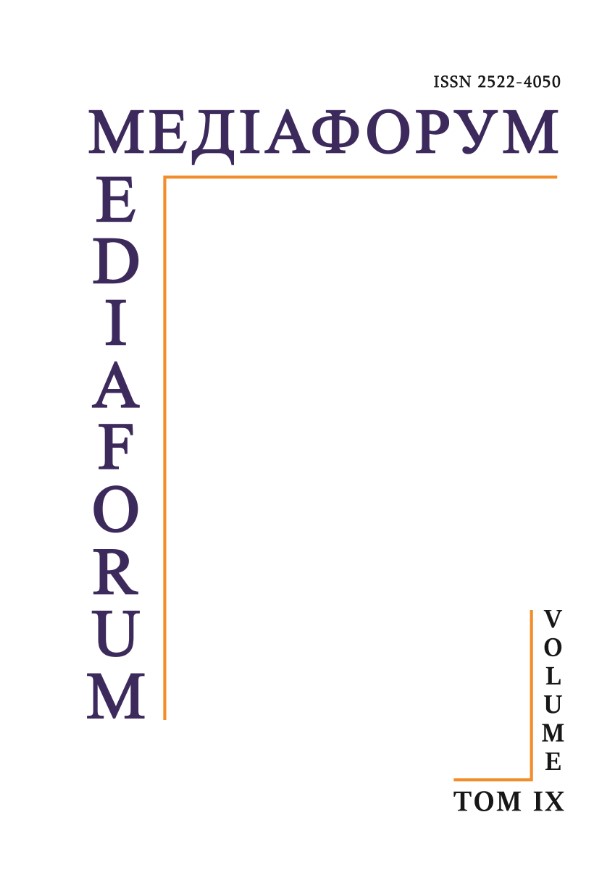Germany’s Position Concerning the Nord Stream-2 Pipeline in the Context of the European Union’s Energy Security
DOI:
https://doi.org/10.31861/mediaforum.2021.9.108-127Keywords:
Germany, Energiewende, Nord Stream-2, energy security, energy policy, security of supply, hybrid threatsAbstract
The article analyzes the underlying foundations of Germany’s position regarding the construction of Russia’s Nord Stream 2 pipeline, as well as the impact of this position on the European Union’s joint energy policy and energy security. Against the backdrop of the constantly growing energy consumption both globally and in EU specifically, supplies of energy sources are being increasingly used by exporters as an instrument of political influence. In this context, the Nord Stream-2 pipeline is regarded as such an instrument, primarily by Russia itself. On the other hand, Germany has been supporting the construction of the new Russian pipeline due to the need to ensure uninterrupted supply of cheap natural gas. The latter is of particular significance for the realization of Germany’s long-term energy transformation strategy. However, by sticking to such a position, Germany prioritizes its own political and economic interests over those of EU and individual Member States, which is contrary to one of the main principles of EU’s functioning, i.e., the principle of solidarity. With this in mind, it is reasonable to conclude that Germany is almost single-handedly defining the strategic direction of the entire EU’s energy policy without paying due attention to alternative suppliers and sources.
Downloads
References
Cotella, Giancarlo, and Silvia Crivello. 2016. “The Macroregional Geopolitics of Energy Security.” In Low-Carbon Energy Security from a European Perspective, edited by Patrizia Lombardi and Max Gruenig, 81–108. Elsevier. https://doi.org/10.1016/B978-0-12-802970-1.00004-8.
Eddy, Melissa. 2018. “Why ‘Green’ Germany Remains Addicted to Coal.” The New York Times. October 10, 2018. https://www.nytimes.com/2018/10/10/world/europe/germany-coal-climate.html.
“Energiewende International.” 2019. Auswärtiges Amt. August 20, 2019. https://www.auswaertiges-amt.de/de/aussenpolitik/themen/energie/energiewende/238782.
“Energy Import Dependency by Products.” n.d. Eurostat. Accessed April 17, 2021. https://ec.europa.eu/eurostat/databrowser/view/sdg_07_50/default/table?lang=en.
“Energy in Transition – Powering Tomorrow.” n.d. Accessed April 17, 2021. https://www.energiewende-global.com/.
Eser, P., N. Chokani, and R. Abhari. 2019. “Impact of Nord Stream 2 and LNG on Gas Trade and Security of Supply in the European Gas Network of 2030.” Applied Energy 238 (March): 816–30. https://doi.org/10.1016/j.apenergy.2019.01.068.
“EUR-Lex - 52014DC0330 - EN.” n.d. Accessed April 18, 2021. https://eur-lex.europa.eu/legal-content/EN/TXT/HTML/?uri=CELEX:52014DC0330&from=ES.
“Gazprom Begins Gas Supplies to Serbia via New Route Starting from January 1, 2021.” 2021. Gazprom. January 1, 2021. https://www.gazprom.com/press/news/2021/january/article521930/.
“Hungary to Join TurkStream Gas Pipeline.” 2020. Warsaw Institute. June 30, 2020. https://warsawinstitute.org/hungary-join-turkstream-gas-pipeline/.
“Interview Mit Der Tageszeitung Rheinische Post.” n.d. Bundespräsidialamt. Accessed April 17, 2021. https://www.bundespraesident.de/SharedDocs/Reden/DE/Frank-Walter-Steinmeier/Interviews/2021/210206-Interview-Rheinische-Post.html.
Jirušek, Martin. 2020. “The Attitude of the Visegrad Group Countries towards Russian Infrastructural Projects in the Gas Sector.” Energy Policy 139 (April): 111340. https://doi.org/10.1016/j.enpol.2020.111340.
Mata Pérez, María de la Esperanza, Daniel Scholten, and Karen Smith Stegen. 2019. “The Multi-Speed Energy Transition in Europe: Opportunities and Challenges for EU Energy Security.” Energy Strategy Reviews 26 (November): 100415. https://doi.org/10.1016/j.esr.2019.100415.
Pflugmann, Fridolin, Ingmar Ritzenhofen, Fabian Stockhausen, and Thomas Vahlenkamp. 2019. “Germany Energy Transition at a Crossroads.” McKinsey & Company. November 21, 2019. https://www.mckinsey.com/industries/electric-power-and-natural-gas/our-insights/germanys-energy-transition-at-a-crossroads#.
Ritchie, Hannah, and Max Roser. 2020. “CO₂ and Greenhouse Gas Emissions.” Our World in Data. 2020. https://ourworldindata.org/co2-and-other-greenhouse-gas-emissions.
Rodríguez-Fernández, Laura, Ana Belén Fernández Carvajal, and Luis Manuel Ruiz-Gómez. 2020. “Evolution of European Union’s Energy Security in Gas Supply during Russia–Ukraine Gas Crises (2006–2009).” Energy Strategy Reviews 30 (July): 100518. https://doi.org/10.1016/j.esr.2020.100518.
Stern, Jeremy. 2021. “Germany Will Never Back Down on Its Russian Pipeline.” Foreign Policy. February 25, 2021. https://foreignpolicy.com/2021/02/25/germany-will-never-back-down-on-its-russian-pipeline/.
Sytas, Andrius. 2016. “EU Leaders Sign Letter Objecting to Nord Stream-2 Gas Link.” Reuters. March 16, 2016. https://www.reuters.com/article/uk-eu-energy-nordstream/eu-leaders-sign-letter-objecting-to-nord-stream-2-gas-link-idUKKCN0WI1YV.
Sziklai, Balázs R., László Kóczy, and Dávid Csercsik. 2020. “The Impact of Nord Stream 2 on the European Gas Market Bargaining Positions.” Energy Policy 144 (September): 111692. https://doi.org/10.1016/j.enpol.2020.111692.
“Tagesschau 20:00 Uhr, 11.03.2021.” n.d. YouTube. Accessed March 17, 2021. https://www.youtube.com/watch?v=4LxiOFsTSbI.
Verner, Duane, Agnia Grigas, and Frederic Peet. 2019. “Assessing Energy Dependency in the Age of Hybrid Threats.” The European Centre of Excellence for Countering Hybrid Threats. https://www.hybridcoe.fi/wp-content/uploads/2020/07/Assessing_Energy_Dependency_in_the_Age_of_Hybrid_Threats-HybridCoE.pdf.
Wettengel, Julian. 2020. “Germany’s Dependence on Imported Fossil Fuels.” Clean Energy Wire. 2020. https://www.cleanenergywire.org/factsheets/germanys-dependence-imported-fossil-fuels.
Wettengel, Julian. 2021. “Gas Pipeline Nord Stream 2 Links Germany to Russia, but Splits Europe.” Clean Energy Wire. 2021. https://www.cleanenergywire.org/factsheets/gas-pipeline-nord-stream-2-links-germany-russia-splits-europe.
Kravchenko, Olha Serhiivna. 2020. “«Pivnichnyi Potik-2» Yak Mekhanizm Ekonomichnoho Vplyvu RF Na Polityku Derzhav Yevropeiskoho Soiuzu.” Visnyk KhNU Im. V.N. Karazina. Seriia «Mizhnarodni Vidnosyny. Ekonomika. Krainoznavstvo. Turyzm», no. 12: 50–58. https://doi.org/10.26565/2310-9513-2020-12-04.
Kuntse. Tomas. 2020. “Cevernyy Potok 2: Finalnyy Etap.” Konrad-Adenauer-Stiftung. https://www.kas.de/documents/252038/7938566/Nord+Stream+2.+Die+letzte+Phase+Russisch.pdf/d0ac16a8-c320-3a46-44e0-5fdc52238950?version=1.0&t=1587551436744.
“‘Pivnichnyi Potik-2. Tse Teper Putin Na Hachku v Merkel, a Ne Navpaky, – Profesor Zubov.” n.d. Espreso. Accessed June 5, 2021. https://espreso.tv/pivnichniy-potik-2-tse-teper-putin-na-gachku-v-merkel-a-ne-navpaki-profesor-zubov.
“‘Pivnichnyi Potik - 2 Mozhe Staty Rozminnoiu Monetoiu Na Koryst Zberezhennia Suverenitetu Ukrainy, – Feihin.” n.d. Espreso. Accessed June 5, 2021. https://espreso.tv/pivnichniy-potik-2-mozhe-stati-rozminnoyu-monetoyu-na-korist-zberezhennya-suverenitetu-ukraini-feygin.
Stryhul, A. S. 2020. “«Pivnichnyi Potik-2»: Naslidky Dlia YeS i Ukrainy.” Naukovi Zapysky Studentiv Ta Aspirantiv. Seriia «Mizhnarodni Vidnosyny», no. 5: 75–85. https://eprints.oa.edu.ua/8265/1/9.pdf














